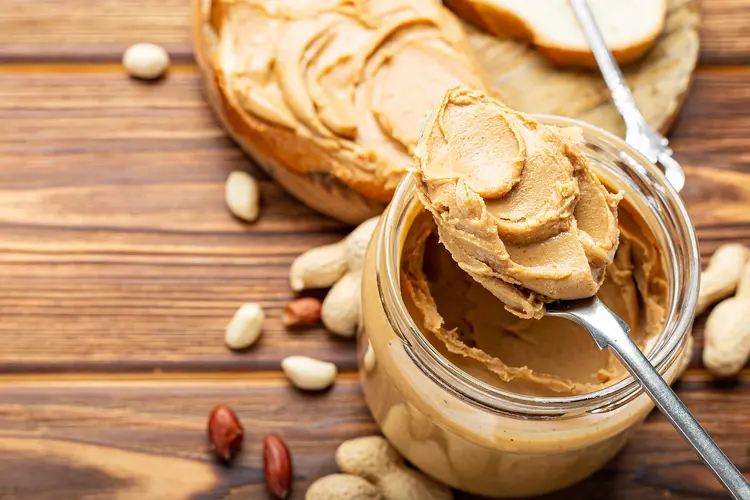For years, peanut butter has been celebrated as a versatile and nutrient-rich food that fits into a wide range of diets. Now, many nutritionists, including top doctors in the United States, are highlighting the surprising benefits of having just a spoonful of peanut butter before bed. This creamy and satisfying spread is not just a childhood favorite; it may actually help support your sleep quality, nighttime metabolism, and overall health when consumed in moderation.
Why Peanut Butter at Night?
Peanut butter is packed with protein, healthy fats, vitamins, and minerals, all of which make it a nutrient-dense snack. Eating a spoonful before bed can help stabilize blood sugar levels throughout the night, keeping hunger pangs at bay and preventing that early-morning crash. According to sleep experts, late-night hunger is a common reason for disrupted sleep, and a small protein-rich snack like peanut butter can address that issue effectively.
Furthermore, peanut butter contains tryptophan, an amino acid that plays a crucial role in producing serotonin and melatonin—neurotransmitters responsible for regulating sleep and mood. When paired with a source of carbohydrates, tryptophan is more effectively absorbed, potentially leading to better and deeper sleep.
Supports Muscle Recovery and Growth
For individuals who work out or have active lifestyles, a spoonful of peanut butter before bed can aid in muscle recovery. The protein content in peanut butter provides a slow and steady release of amino acids into the bloodstream overnight, supporting the body’s natural repair processes. This is particularly beneficial for those looking to maintain lean muscle mass or recover from intense exercise sessions.
The healthy fats in peanut butter also contribute to feeling satiated for longer, ensuring you’re not waking up in the middle of the night craving snacks.
Helps Manage Weight and Metabolism
Contrary to popular belief, eating peanut butter at night doesn’t necessarily lead to weight gain—especially when portion sizes are controlled. Peanut butter is rich in monounsaturated and polyunsaturated fats, which have been linked to improved metabolism and better fat utilization by the body. By keeping blood sugar stable and curbing late-night cravings, it may help prevent overeating the next day.
Nutritionists emphasize that moderation is key: one tablespoon is enough to enjoy the benefits without adding excessive calories.
Promotes Heart Health
Peanut butter is a source of heart-healthy fats, magnesium, and vitamin E. Regular consumption of foods rich in these nutrients has been associated with improved cardiovascular health, reduced inflammation, and better cholesterol levels. Having it before bed offers a convenient way to meet your daily intake of these essential nutrients without large meals late at night.
May Improve Sleep Quality
Poor sleep is often linked to fluctuating blood sugar levels and insufficient intake of sleep-regulating nutrients. Peanut butter’s combination of protein, fat, and tryptophan creates a steady supply of energy, preventing the sudden dips that can trigger waking up during the night. Additionally, tryptophan supports melatonin production, which can help you fall asleep faster and enjoy more restful sleep cycles.
For an added boost, pairing peanut butter with a small piece of whole-grain toast, a banana, or apple slices can enhance tryptophan absorption, making it an even more effective bedtime snack.
Practical Tips for Incorporating Peanut Butter Before Bed
- Stick to natural options: Choose peanut butter with minimal added sugar, salt, or hydrogenated oils for the healthiest results.
- Portion control matters: One tablespoon is generally sufficient; more than that may add unnecessary calories.
- Pair smartly: Combine with complex carbs or fiber-rich fruits for added nutritional benefits and better sleep.
- Consistency is key: Make it part of a balanced diet rather than a nightly indulgence.
Potential Considerations
While peanut butter offers numerous benefits, it may not be suitable for everyone. Individuals with nut allergies should obviously avoid it. Those managing calorie-restricted diets or certain metabolic conditions should monitor portion sizes. Also, late-night eating in general should be approached with awareness; overeating any food before bed can lead to discomfort and affect sleep quality.
The Bottom Line
A spoonful of peanut butter before bed is more than just a comforting treat; it’s a nutrient-packed snack that can promote better sleep, support muscle recovery, stabilize blood sugar, and even benefit heart health. As top US doctors and nutritionists advise, incorporating small, protein-rich snacks like peanut butter into your evening routine can be a simple yet effective way to improve your overall well-being.
If you enjoy peanut butter and it fits your dietary needs, consider making this creamy delight your go-to nighttime snack—just remember that moderation and mindful pairing are the keys to reaping its full benefits.
Do Follow Us On Instagram







